To coincide with the launch of his latest poetry collection, ‘The Dogs of Humanity’, I’m hosting poet Colin Dardis, who discusses here the overlaps between poetry and mental health in his work:
“I have not been named,
so they never talk of me. I call myself runt,
a title earnt through exclusion.”
(‘Runt’)
I’m twelve, and sitting in my doctor’s GP clinic, waiting to be seen by a nurse for an appointment. The reason why I am here exactly have been lost through the distance of time. However, a new reason for future appointments will soon appear.
I’m on a cushioned bench, on my own, outside the nurse’s office. The colours are all pastel blue and light grey, simple neutral tones you’ll find in any surgery. Suddenly, I’m overwhelmed by a pounding headache, a sense of dizziness… I feel like monsters are rushing at my from off the walls, creatures I can’t really see but it feels like a video game where you can’t shoot fast enough. I close my eyes and lower my head. The sensation lasts a minute and then passes. I don’t know what to make of it, and do not mention it to anyone.
Years later, I came to realise that this was my first panic attack. And since then, I’ve been struggling with depression and anxiety all throughout my adolescence and adult life.
“How many are scared tonight?
How many want to burrow into the nest
like the newly-hatched cuckoo
and cry the loudest in order to fed…”
(‘The Humane Animal’)
Of course, I didn’t realise this at the time. In my teens, I didn’t identify as someone with depression, didn’t seek a diagnosis, or given any medication or therapy. Twenty years ago, there just wasn’t the awareness we have now of these issues. So instead of talking openly about these issues, knowing I was somehow different from ‘the norm’, everything went into poetry instead.
Writing allows a realm in which to explore and try to understand the things that didn’t make sense in everyday life. How do people relate to each other? How is one supposed to behave? What am I expected to do with my feelings? Life rarely gave answers to these questions, but in poetry, you could create your own makeshift answers. Or at least, the question seems less daunting than before.
A lot of poetry in the past has been introspective, as mental health was my main impetus to write. However, as I’m grown older (not necessarily matured!), and grown more comfortable in sharing my experiences, I’ve realised that more and more people are experiencing something similar to me. That at times they have felt lost, unsure of the future, burdened with a grief they can’t quite explain. And so my poetry has moved to try and look at that bigger question of the human condition, to advocate for more empathy from people, to dig into a place of resilience. In a society where we say “it’s okay not to be okay”, there are still so many people unable to speak up. Poetry, whether in the act of writing or reading it, gives us the opportunity to find those words unsaid, to perhaps find a little comfort through words, which ultimately, can lead to actions.
“Life would not reach print
by the high demands
of us human publishers,
yet it is the only manual
we have to read.”
(‘Unpublished’)
Colin’s new collection, ‘The Dogs of Humanity’, is out 1st August, available to pre-order now from Fly On The Wall Press:
Print: https://www.flyonthewallpoetry.co.uk/product-page/pre-order-the-dogs-of-humanity-by-colin-dardis
Kindle: https://www.amazon.co.uk/Dogs-Humanity-Chapbook-Colin-Dardis-ebook/dp/B07TCBCZ64/ref=sr_1_3

